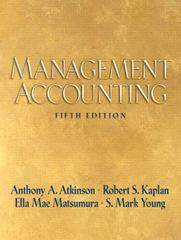Question
Performance Apparel Inc. (PA) is a retailer of sports apparel and footwear. PA's operations are based in Beaverton, Oregon, with retail stores located throughout the
Performance Apparel Inc. (PA) is a retailer of sports apparel and footwear. PA's
operations are based in Beaverton, Oregon, with retail stores located throughout the
country. In an effort to motivate certain members of senior management to execute
consistently with PA's long-term financial performance plan, it decided to issue
performance-based restricted stock units (RSUs) on January 1, 2014.
RSUs are a form of compensation offered by an employer in the form of company stock.
These shares of company stock are "restricted" in that they vest only after certain
conditions (restrictions) are met. The shares are earned or "vested" based on a vesting
schedule consistent with the satisfaction of these conditions. Vesting schedules are
specific to each award and can be based on various conditions such as service (remaining
with the employer for a certain period of time), performance milestones (such as meeting
sales goals), or a combination.
These RSUs cliff vest (shares vest at a point in time) on the basis of continued
employment after three years, with the number of RSUs earned and issued at the end of
the three-year vesting period, if any, dependent on two performance conditions:
1. Three-year average organic revenue growth.
2. Three-year average operating margin.
Since PA has not previously issued these types of awards, it does not have knowledge of
the relevant accounting literature and guidance on how these contingently issuable shares
should be accounted for in their diluted earnings per share (EPS) calculation.
Accordingly, as PA's external auditor, management has asked for your assistance with its
financial statements as of and for the year ended December 31, 2014.
I need help in understanding this case as no EPS calculation seems to be possible. Given the 4 Scenarios I am not sure if I should answer each scenario with answers to questions or should I combine all the scenarios and derive a growth percentage for questions 1 and 2 using the 4 Scenario's in combination .. also what factors contribute to the limits of calculating the growth.
Step by Step Solution
There are 3 Steps involved in it
Step: 1

Get Instant Access to Expert-Tailored Solutions
See step-by-step solutions with expert insights and AI powered tools for academic success
Step: 2

Step: 3

Ace Your Homework with AI
Get the answers you need in no time with our AI-driven, step-by-step assistance
Get Started


